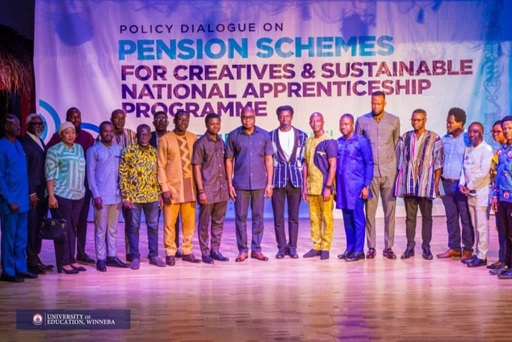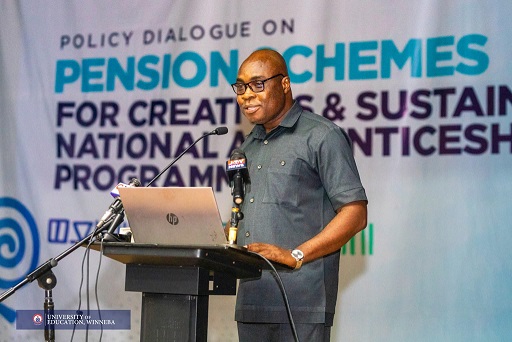Speakers at a policy dialogue on pensions for Ghanaian creatives have called for greater commitment towards a workable scheme to secure the future of Ghanaian creatives to preserve Ghana's heritage.
They indicated that ad hoc support schemes for creatives, particularly for pensions, left the sector unattractive for the young ones.
Several speakers urged the establishment of feasible and dependable schemes that would provide decent retirement conditions for Ghanaian creatives.
The dialogue was organised by the Centre for Research, Culture and Creative Arts of the School of Creative Arts (CeRCCA) of the University of Education, Winneba (UEW).
It aimed at bringing attention to the need for a sustainable pension scheme for Ghanaian creatives and a sustainable national apprenticeship programme.
The dialogue highlighted two technical research reports on a pension scheme for the creatives and a sustainable apprenticeship programme.
It was attended by representatives from the Musicians Association of Ghana (MUSIGA), Film Producers Association of Ghana (FIPAG) and the Ghana Music Rights Organisation (GHAMRO), among others.
A professor with the School of Creative Arts of UEW, Prof. Emmanuel Obed Acquah, speaking on the Developing Pension Scheme for Ghanaian Creatives and Artisans, said the current Social Security and National Insurance Trust (SSNIT) Pension scheme did not fully address the welfare needs of creatives.
That, he indicated, was due to factors, including the volatility of incomes in the sector, the informal nature of the sector and policy gaps.
The situation, he said, had left many in the sector without dignified retirement welfare and support.
Threat
Prof. Acquah said this posed a threat to the creative sector, which, he said, held great potential to contribute significantly to the national economy.
He called for a legal framework for creatives' pension scheme and the establishment of an independent regulatory body to oversee the scheme for efficiency and sustainability.

The Vice-Chancellor of UEW, Prof. Stephen Jobson Mitchual, said the creative industry remained a powerhouse, but the lack of a comprehensive retirement security scheme made the industry unattractive and posed an existential threat to practitioners as they age or are incapacitated.
“We have witnessed it. We have seen it. People who were doing very well all of a sudden, begging some people to pay their rent, and as a result of stress, within a few days, they just die off,” he stated.
He disclosed that CeRCCA research proposed policy recommendations for a tailored guidance for creatives' pension scheme to address these gaps, noting, "By securing our creatives, we secure Ghana's soul”.
He commended the CeRCCA for the initiative and called for stronger collaboration with other organisations to create a significant impact on culture and creative art for livelihood empowerment, culture preservation and promotion.
The Dean of the School of Creative Arts, Prof. Evans Asante, said the topics had long occupied the periphery of national dialogue and policy discussion despite their immense contribution to national development.
Prof. Osuanyi Quaicoo Essel said Ghana needed a sustainable apprenticeship model that would address the gaps in training and employment.
He said studies had confirmed that people with skills were easily employed, explaining that a robust national apprenticeship programme would help deal with the high unemployment problem.
The Chief Executive Officer of GHAMRO, Jackson Brefo, called on academia to collaborate with industry to equip up-and-coming creatives on creative laws and ethics.

